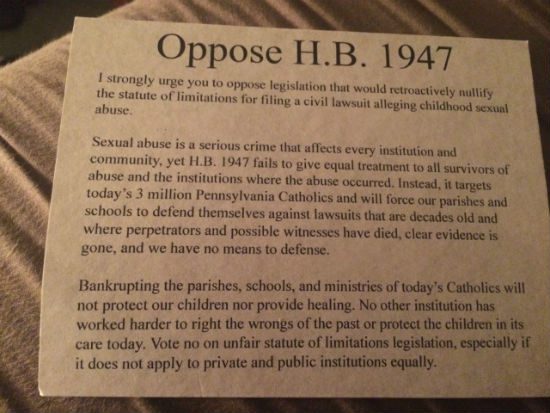• I’m saddened by the death of Eugene Peterson. His colloquial translation of the Bible, The Message, is a massive achievement. It’s also a great resource for those of us not thoroughly fluent in Greek and Hebrew, a way of getting a sightly different, refreshing angle on a text that can sometimes seem dulled by familiarity.
One of my favorite pieces from Peterson was his delightful essay on the delight of mystery novels. I’ll have to see if I can dig that out and revisit it here.
My main exposure to Eugene Peterson, though, was probably indirect. It was not from any encounter with the man himself or with his writing, but with others who had absorbed and treasured that writing. I’ve known many such people — including my former college president, Roberta Hestenes — and learned a great deal from them.
There was an ugly news cycle last year involving Peterson — the all-too-common pattern in which he said some Good Things, got Ciziked for it, and then lamentably backtracked incoherently. But if I consider Eugene Peterson through the lens of the people I’ve known whose lives he influenced, then I have to admire him greatly. He was a good tree who bore good fruit.
• Steve Benen makes a few more points on Pat Robertson’s appalling defense of his good friends the Saudi royals:
First, there is no $100 billion arms deal. Second, Robertson was perfectly willing to jeopardize an international alliance over one person when the person was a Christian evangelist in Turkey. Third, drawing a moral parallel between the United States and Saudi Arabia – as if the two countries have comparable records on human rights – is quite a departure from the right’s usual approach to patriotism.
Robertson is now diving back into all the anti-Semitic conspiracy theories he touted back in the 1990s in books like New World Order. Pat Robertson is a rotten tree, and he is bearing rotten fruit.
• Maria Panaritis of the Philly Inquirer talks to NPR about “How The Clergy Abuse Scandal Is Affecting Catholics In Pennsylvania” (via). This part rang true for me as describing a real shift I’ve seen in conversations with Catholic neighbors here in Chester County:
I started writing about this on and off in 2002 as a reporter, and what I noticed was initially a lot of anger toward us, and how dare you bash the church? And that has faded significantly in the last several years as I’ve done more reporting, as more grand jury work has come out, as I’ve done my own investigative work on this. It is overwhelmingly a different story. I hear from people who describe themselves as Catholics who are now disaffected, who are angry, who want to side with the victims, who say, enough is enough with the bishops.
… I think a lot of people – it’s very difficult for them to see what has now become document-based excoriation of systemic practices within this institution and not wonder what the heck is going on. There’s a deep distrust, I think, and shock that this institution seems to have shown such a pattern internally of very, very bad behavior and no sanction.
I don’t know how much we’ll see this in next month’s election, but “enough is enough with the bishops” is bound to have some effect on the political alignment of Pennsylvania Catholics, because those bishops have been wholeheartedly aligned with the Republican project here. And Republican politicians in Pennsylvania have embraced the bargain: “Republican-Led PA Senate Refuses to Pass Bill To Help Victims of Child Sex Abuse.”
In 2012 and 2014 and 2016, those Republicans helping out their friends the bishops could count on support from Catholic voters who were being urged — and commanded, and lied to — to see all of this talk of the sexual abuse of children as nothing more than a witch-hunt by the biased lib’rul media. They weren’t angry about the abuse, they were angry at the media. But that’s changing.
If Catholic voters in Pennsylvania are no longer willing to overlook the indefensible, the indefensible will no longer have quite as easy a time of it in instructing them how to cast their votes.
• John Fea gets a look at a strange, unique artifact of white American Vichy Christianity: An Oral Roberts book inscribed by Steve Strang as a gift to a young Jay Sekulow. Layers, and layers, and layers of fecund horror to be explored in that.
• Anton LaVey appears as a character in this season’s installment of American Horror Story. Or, rather, a campy, even-more theatrical version of the media figure created and endlessly hyped by LaVey appears in the show — Phil Owen has a good rundown of the difference in his recap of the episode: “‘AHS: Apocalypse’: Anton LaVey, the ‘Black Pope’ of the Church of Satan, Was a Real Person.”
I’d tweak that somewhat. Howard Stanton Levey was a real person, and a gifted showman who created the character of “Anton Szandor LaVey,” but LaVey was never a real person.
Anyway, here’s my favorite anecdote about LaVey, involving two evangelical journalists, a Gershwin medley, and instant coffee.
And here’s Doris Day performing one of Anton LaVey’s favorite songs (with Gene Nelson) in Lullaby of Broadway.













